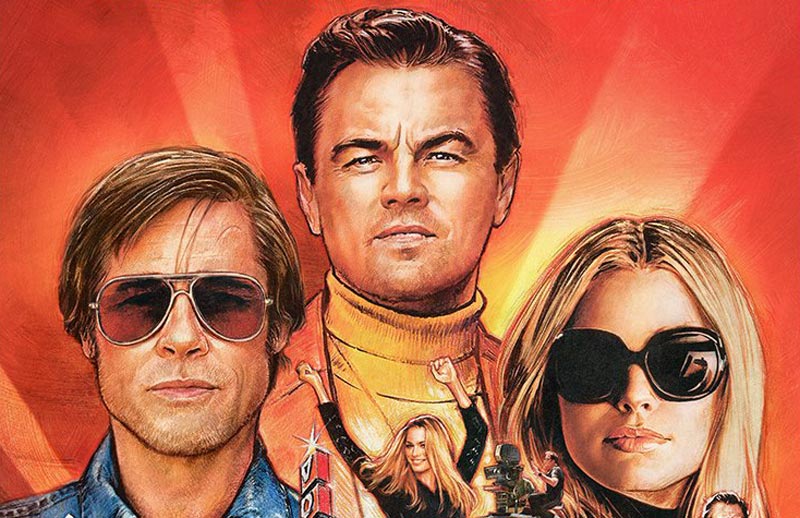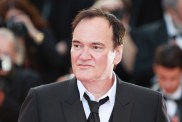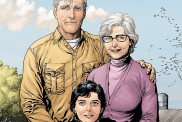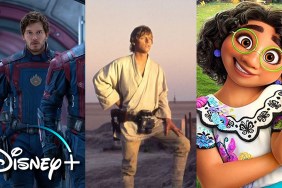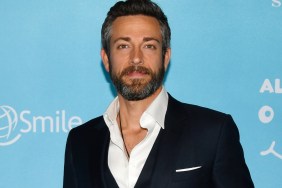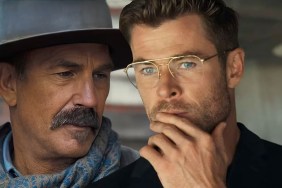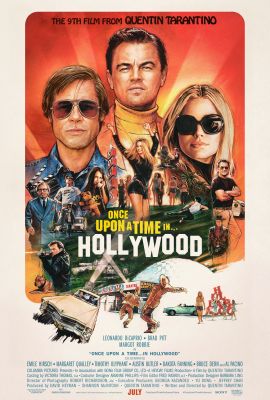 RATING:
RATING:
8 / 10
CAST:
Leonardo DiCaprio … Rick Dalton
Brad Pitt … Cliff Booth
Margot Robbie … Sharon Tate
Al Pacino … Marvin Schwarzs
Kurt Russell … Randy
Damon Herriman … Charles Manson
Luke Perry … Wayne Maunder
Dakota Fanning … Squeaky Fromme
Timothy Olyphant … James Stacy
Damian Lewis … Steve McQueen
Emile Hirsch … Jay Sebring
Mike Moh … Bruce Lee
Lorenza Izzo … Francesca Capucci
Directed by Quentin Tarantino
Once Upon a Time In Hollywood Review:
There are things we know we’re getting when we see a Quentin Tarantino movie. Endless strings of pop culture, an ensemble cast on their A-Game, poetry written in curse words, and gratuitous feet shots. Tarantino knows that we know these things are coming, and Once Upon a Time in Hollywood is his chance to indulge us in what he wants to show us but also what we know we’re getting. He also makes sure to highlight another key trademark: the completely unexpected.
On the surface, Once Upon a Time in Hollywood is about Leonardo DiCaprio’s Rick Dalton, a washed-up actor and once-leading man of a hit series who now bounces around doing guest spots. A man without an aim who has been pigeonholed. Alongside him is his stunt double and general pal, Brad Pitt’s Cliff Booth, whose Lebowski-like demeanor doesn’t change the fact that he’s a man that wears many hats. They roam about town, bounding from job to job, and cross paths with the wildest parts of the world in what amounts to a 60s set, QT concocted circus.
DiCaprio and Pitt together are peanut butter and jelly, dissimilar flavors that work together and apart, and the built-in layers of the story allow the two of them to explore these characters in often hilarious scenarios. From confronting addiction to fixing the TV antenna and even meeting the Manson family, there’s a funny edge that is ever present, bolstered by the pair. Even DiCaprio, despite proving how hilarious he can be with the likes of Wolf of Wall Street, positions himself as one of driving forces of jokes in the entire piece. Pitt has previously been described as someone with a leading man face best suited for character actor parts, and a role like this is tailor made for someone with those chops. It should surprise no one who saw Pitt in Basterds that he’s got some of the best moments in the entire piece and he milks them for all their worth, and we love every drop.
Margot Robbie as Sharon Tate is also one of the highlights of the film, and the genius of what Tarantino and Robbie do is make the late actress more than this figure of legend. Robbie grounds her into the story by delivering the playful side of Tate, reminding us that she was just like us. Sharon was a person. She had friends. She lived and she loved and she had wishes. She bought presents for her husband. She went to the movies. But Tarantino makes sure we know that she’s also more than that. Tate was an icon and a symbol. One moment of the film even sees a literal halo form around her head from a film projector. She was just like us, she could sit in a theater and laugh, but she’s the one we’re there to watch. Celluloid has christened her.
As a cohesive construction though, Once Upon a Time in Hollywood meanders. It has a lot of plates it’s spinning, a lot of fingers in a lot of pies, but sometimes it gets lost in the weeds. Sequences play a little longer than perhaps needed just to soak in the limelight of the moment and the time. Flashbacks lead to flashbacks within flashbacks. At a certain point the audience gets where it’s going, but the movie is still interested in giving the scenic room. Running over two hours and forty minutes, you feel every extra second. But this is Tarantino’s choice of indulgence. He created this playground and he’s going to get every minute on the monkey bars that he can.
There are some distracting elements of Tarantino’s playfulness with his homage to this era though. Frequent shifts from cinema to tv and back become disorienting, funny as they are in the grand scheme of the story and layering of the tale. Furthermore, there’s a completely distracting series of jump-cuts with clearly different continuity on screen than was present before. Seemingly just a fun riff from QT about films of the era, but it’s the kind of thing that pulls some viewers right out of the film. Again though, that’s the purpose at hand, Tarantino is having fun and your mileage may vary if these moments bother you or not.
Below all that, Once Upon a Time in Hollywood is about Quentin. The film has a flashy exterior that evokes what can only be the director’s feelings about the past, a longing for that world of before where LA was a beacon and movie stars were icons. Dig further though and you’ll see this movie is about Tarantino himself: a man with a long career built on wild movies “with a whole lot of killing” is unsure what to do with himself now that he’s in middle-age. He could go off and make some westerns or fall further down the hole. He might take his time to explore the world and figure out what it is he wants, but in the end he’s going to give us what WE want.
That’s why the whole picture of OUATIH works. It wanders and it plods about, but it’s because this journey is about finding your place and what to do when you get there. It’s a movie about how we know what we’re watching is fake because the characters on screen know it; they were there when they shot the TV show or the movie they end up watching on screen. The whole thing is a fantasy in the context and on the meta-level. It’s not real, but that doesn’t matter, because it feels real to us and because we’re getting what we want. That’s what Tarantino knows and what he rediscovers here, the power of cinema and the catharsis it provides. At its core, though, the movie is a fairy tale. It’s a tale about answering the call, going to places with signs that say “Here there be dragons,” and rescuing princesses. It’s right there in the title. How do all those stories begin? Once Upon a Time….
Grab your tickets to Once Upon a Time in Hollywood by clicking here!
